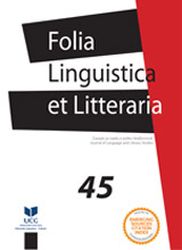AN ANALYSIS OF THE ASSOCIATIVE NETWORKS OF RECENT NOMINAL ANGLICISMS OF SERBIAN AND ENGLISH LANGUAGE MAJORS
AN ANALYSIS OF THE ASSOCIATIVE NETWORKS OF RECENT NOMINAL ANGLICISMS OF SERBIAN AND ENGLISH LANGUAGE MAJORS
Author(s): Marta Veličković, Aleksandra A. JanićSubject(s): Foreign languages learning, Language acquisition, Psycholinguistics
Published by: Filološki fakultet, Nikšić
Keywords: L1 Serbian; L2 English; associative responses; recent Anglicisms; nouns
Summary/Abstract: The aim of this paper is to compare the associative networks of Serbian and English majors to determine possible links between the advanced study of EFL in an academic setting and the conceptualization of select monosemic recent nominal Anglicisms in Serbian. The study included an online questionnaire consisting of 80 stimuli, being 40 pairs of recent nominal Anglicisms and their Serbian equivalents, which were distributed to 100 respondents. The questionnaire required free and discrete associations. The results indicated a strong tendency of English language majors towards synonyms as responses to the Anglicisms, confirming existing claims that EFL proficiency leads to their more frequent occurrence. The English majors also showed a prevalence of hyponyms as lexemes with a more specific meaning as responses to the Anglicisms, as opposed to the Serbian majors, who opted for hypernyms. A diverse range of encyclopedic responses and hapax legomena were noted for the English majors, while an increased occurrence of no responses was noted for the Serbian majors. These findings support the existing claim that fewer responses are usually provided for L2 cues when compared to L1 cues. They further tie in with the conclusion that EFL proficiency is a key component in Word Association Tasks (WATs). Our analysis of prototypes and Idealized Cognitive Models (ICMs) as stable and abstract representations of our non-linguistic knowledge, identified among the associative responses, also proved that the types of responses of the English majors differ from those of the Serbian majors, in that the former opted for more specific and precise meanings in their descriptions of the select Anglicisms.
Journal: Folia Linguistica et Litteraria
- Issue Year: 2023
- Issue No: 45
- Page Range: 43-63
- Page Count: 21
- Language: English

